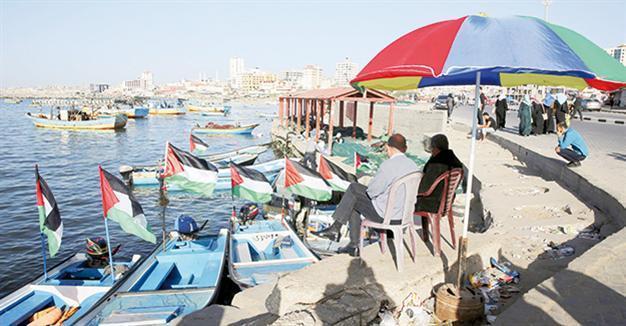Turkey, Israel reach deal to normalize ties: Israeli official
ANKARA
 Israel and Turkey have reached an agreement to normalize relations after six years of strained ties a senior Israeli official told reporters, according to Reuters.
Israel and Turkey have reached an agreement to normalize relations after six years of strained ties a senior Israeli official told reporters, according to Reuters.Turkish Prime Minister Binali Yıldırım is expected to announce the deal on June 27 at 1.00 p.m., private broadcaster CNN Türk has reported.
The Israeli delegation, led by Prime Minister Benjamin Netanyahu’s special envoy, Joseph Ciechanover, and the Turkish delegation led by Turkish Foreign Ministry Undersecretary Feridun Sinirlioğlu, also a former ambassador to Israel, met in Rome on June 26, Büşra Arslantaş of CNN Türk reported.
Turkish-Israeli relations were suspended in 2010 after the Israel Defense Forces (IDF) stormed the Mavi Marmara, part of the Gaza-bound “Gaza Freedom Flotilla,” which was trying to break the Israeli blockade on Palestinians in the Gaza Strip. Ten Turkish activists were killed in the raid.
Following the six-year rupture in ties, the two erstwhile allies are expected to put their signatures on an agreement in July, CNN Türk added.
Turkey has demanded Israel fulfill three conditions prior to any normalization in ties, namely, an apology for the Israeli raid on the Mavi Marmara, compensation to the families of the deceased and an end to the embargo on Gaza.
In March 2013, through U.S. President Barack Obama’s mediation, Netanyahu called the then-prime minister, President Recep Tayyip Erdoğan, and apologized for Israeli “operational mistakes” that resulted in the loss of Turkish lives aboard the ship leading the 2010 flotilla. However, Israel refuses to apologize for the act of stopping the ship, which it regards as a legitimate act of self-defense.
Israel, which is known to have agreed to pay compensation to the families of the victims, is not expected to lift the blockade, but ease it.
An eventual deal is not expected to have any provision regarding Hamas as signaled by recent remarks by Turkish Foreign Minister Mevlüt Çavuşoğlu, as well as a recent visit by Hamas’ exiled political chief, Khaled Mashaal.
Erdoğan met Mashaal in Istanbul on June 24, state-run Anadolu Agency reported. Erdoğan and Mashaal discussed how to resolve the disagreements among Palestinians as well as Turkish humanitarian assistance, the report said, citing an unnamed source from Erdoğan’s office.
Last week, Çavuşoğlu made clear that any deal between Turkey and Israel to normalize their strained relations depended on action taken by Tel Aviv, adding that Turkey’s relationship with Hamas in Gaza could not be a subject for the talks.
“Whether a balance is to be struck or not in the first next meeting – this depends on the steps that Israel will take. Our conditions are extremely plain, these [conditions] need to be fulfilled, like how our demand for an apology was fulfilled,” Çavuşoğlu said June 22 at a press conference in Ankara.
‘Humiliating people’s intelligence’
On June 26, Israeli daily Haaretz reported that the declaration expected June 26 was made possible following understandings the sides reached 10 days ago about Hamas activities in Turkey. Mossad chief Yossi Cohen, who went on a secret visit to Turkey, agreed with National Intelligence Organization (MİT) Undersecretary Hakan Fidan on the framework of the deal.
Accordingly, Turkey will not enable Hamas to conduct, plan or direct any military activity against Israel. However, Hamas offices may continue to operate in Turkey for the purpose of diplomatic activity, Haaretz said, without citing any source.
Turkish Foreign Ministry officials, approached by the Hürriyet Daily News concerning the report by Haaretz, declined to comment.
The Jerusalem Post reported claims by Hamas which said Turkey had renounced the condition that Israel lift the siege on Gaza as part of its prerequisites for reconciliation.
The daily quoted unnamed Hamas officials as saying in a conversation with the London-based Arab newspaper Rai al-Youm: “Turkish President Recep Tayyip Erdoğan announced to Hamas’ leadership that he has done everything possible to lift the siege or ameliorate it, but the Israeli government stubbornly rejected his attempts.”
“Erdoğan told the leadership that he must make progress on the normalization deal with Israel in order to serve Turkey’s interests,” the same official in Hamas was quoted as saying.
The unnamed Hamas officials said “they expect Turkey to take strong measures against senior Hamas officials residing in Turkey, mainly by limiting their freedom of movement within the state, to meet Israel’s condition for normalization.”
“Saying that Turkey has given up one of its two remaining conditions, which is lifting the embargo and blockade on Gaza, would mean humiliating the people’s intelligence. If Turkey had given up these [conditions], then relations would have been normalized by now,” said Çavuşoğlu.
Energy aspect
An eventual deal would pave the way for multibillion-dollar natural gas contracts as Israel seeks to export fuel from its largest field and Turkey looks to reduce its reliance on Russian gas. However, the deal is not expected to outline such a particularity because the development of natural gas reserves require legal arrangements to be adopted by the Knesset – something that is likely to take three or four years.
















